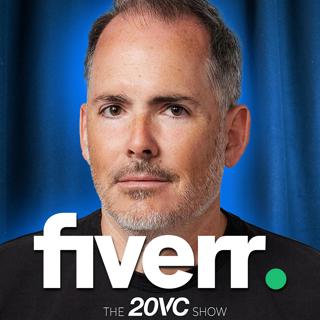
20 VC 031: Investing in Gaming, Luxury Goods and Disruption with Maha Ibrahim, General Partner @ Canaan Partners
Maha Ibrahim is General Partner at Canaan Partners. Maha is renowned in the venture industry for her ability to to spot technology trends extremely early, proven through Maha being one of the 1st investors to recognise the huge potential of social gaming. As a result, Maha led Canaan's early investment in social games pioneer PicksPal (acquired by Liberty Media) and was a seed investor in Kabam, the world's largest developer of massively multiplayer social games. Due to Maha's incredible success in venture, she was included in Silicon Valley the '40 Under 40' award by The Silicon Valley Business Journal and is a regular on Bloomberg TV. Items Mentioned in Today's Show: The Real Real ClusterHQ Lending Club In today's episode you will learn: How Maha made her transition into the world of Venture Capital? As one of the 1st investors in social gaming, what did Maha see that other people did not? With the gaming industry being as fast moving and fickle as it is, shown through the likes of Zynga's troubles, is Maha concerned for her gaming portfolio companies, in their ability to maintain their dominant presence in the sector? Maha is an investor in The Real Real, a company which had revenues of over $100m last year. What does Maha believe is the reason for this incredible success and where does she see the future for The Real Real? Increasing amounts of capital means increasing competition for VCs, what does Maha believe VCs can bring to the table to beat off the competition? What is Maha most impressed by, in terms of entrepreneurs pitching to her? Where does Maha believe the next big forms of disruption are coming from? We finish today's episode with a quick fire round where we hear Maha's thoughts on the hardest part about being a VC, how Maha measures her success as a VC and her most recent investment and why she said yes? You can follow Maha on Twitter here!
27 Huhti 201521min

20 VC 030: VC Funds, Angels and IPOs with John Taylor, Head of Research @ NVCA
In today's show I am joined by John Taylor, a nationally recognised authority in the venture capital and entrepreneurial finance sector. Currently, John is Head of Research at the National Venture Capital Association (NVCA). In 2003, he co-founded the NVCA CFO Task Force which focuses on regulation and emerging issues dealing with a diverse range of Some of the many gems of this conversation include: where venture funds actually obtain their funds from, what is the main difference between an angel and a VC, what investors expect from their VCs, how has the IPO market changed since 2000, what do VCs look for in potential investments, how do VCs manage their time, what is the typical workload of a VC, can University students go straight into the VC industry? Items Mentioned in Today's Show: Dave McClure | Lean VC | 500 Startups Andreeson Horowitz
23 Huhti 201522min

20 VC 029: The Potential Upside To A Technology Bubble with TechCrunch's Brandon Lipman
The debate over whether or not we are in a tech bubble is dominating the minds of many in the tech world and today Harry talks to major player, Brandon Lipman, Co-Founder of 3DLT and writer of the recent TechCrunch Article: The Potential Upside To A Technology Bubble. Brandon shares his views on why seed deals have decreased by 300%, following from Scott Nolan's TechCrunch article, Brandon answers Does Burn Rate Really Matter, what sectors will survive or thrive in a tech bubble and why companies are preferring to raise later rounds rather than go public. They also dive into the dogfight between Meerkat and Periscope, the biggest winners from a bubble and the companies Brandon is most excited about. Items Mentioned in Today's Show: Chris Sacca and Tony Hawk with Jason Calacanis on TWIST 500 Startups: Dave McClure on Stanford's Entrepreneurial Thought Leaders MatterMark Complete Report Meerkat vs Periscope
20 Huhti 201518min

20 VC 028: Co-Founding TechCrunch and The Benefits of Not Raising Venture Funding with Keith Teare
Keith Teare is the Founder of Palo Alto incubator, Archimedes Labs whose incubated startups include the likes of M.Dot (acquired by GoDaddy), TechCrunch (acquired by AOL) and Ivan Kalanick's Red Swoosh. Keith is also the Co-Founder of TechCrunch alongside Michael Arrington. Prior to TechCrunch Keith founded RealNames Corporation raising more than £130m of venture funding before filing for an IPO with an implied valuation of £1.5bn. Items Mentioned in Today's Show: Michael Arrington The Lean Startup by Eric Ries Chat Center: Universal Chat for Everyone on the Planet DownTown App: Your Personal Waiter Weendy: Sunshine App What you will learn in todays show: How did Keith get into the tech world at a time when technology was not mainstream? A venture of Keith's, Cyberia was heavily used by women. Does Keith believe that there have been improvements in balancing the gender gap? What Keith believes can be done to reduce the gender inequality that persists throughout the tech sector? How did Keith's Co-Founding of TechCrunch with Michael Arrington come about? Why did Keith try and persuade Michael not to create TechCrunch? What are the benefits of bootstrapping your startup and not raising venture funding? Why Keith was never able to raise venture funding in the UK? How is the valley different from creating a company in the UK? Keith's beliefs on the barbell venture capital ecosystem that persists in the US? We then finish today's episode with a quick fire round where we hear the best advice Keith has ever been given, the highlight of his career so far and the 3 companies that he is most excited about and why?
16 Huhti 201529min

20 VC 027: Greg Rogers on Techstars, Mentors and The Potential for Fintech
Greg Rogers is Managing Director at Techstars, the world’s leading accelerator programme for early stage technology start-ups and is responsible for the Barclays Accelerator. Prior to joining Techstars, he spent eleven years in New York City as an entrepreneur and senior manager. Most recently, he was founder and CEO of Pictela, a super rich media technology company that was acquired by AOL in 2010. An active angel, Greg was an early investor in Schedulicity and has recently co-founded SmartUp, a new ed-tech company with Frank Meehan (Siri), Brent Hoberman (Lastminute.com), and Barry Smith (Skyscanner). Items Mentioned in Today’s Show: The Fundraising Rules by Mark Peter-Davis Brent Hoberman, Frank Meehan, Jon Bradford LastMinute.com Aire DoPay Squirrel In today’s episode you will learn: 1.) How Greg got into the TechStars world? 2.) What attracted Greg to the the Fintech space and how has he seen Fintech develop over the last 5 years? 3.) What areas within the Fintech space Greg finds most interesting and why? 4.) What does Greg see the future of Fintech looking like? Does he see any trends arising in the space in 2015? 5.) What does Techstars offer startups and what do they take in return? 6.) What does Greg think are the characteristics of effective mentors? Are mentors necessary for startups in their early growth? 7.) What is Greg’s new venture, SmartUp. Who is involved and what are his plans for the future of SmartUp? We finish today’s episode with a quick fire round where we hear Greg’s plans for the next five years, what tip Greg would give Fintech entrepreneurs and the 3 companies from TechStars or Barclays Accelerator that Greg is most excited about and why?
13 Huhti 201530min

20 VC 026: Chris Redlitz on The Importance of People, Pivoting and The Last Mile
Chris Redlitz is Managing Partner at Transmedia Capital, an early stage venture fund specializing in digital media. Their portfolio includes the likes of Snapchat, Twitter, Linkedin and Facebook, just to name a few. Chris also Co-Founded The Last Mile with his wife Beverly, a program that integrates the nation’s penal system with the technology business. Prior to Transmedia and The Last Mile, Chris launched the first online independent yellow page directory, automated coupon platform and content syndication system. As a result, he received Ad Age's prestigious i20 award for his contributions to the development of interactive marketing and advertising. Items Mentioned in Today's Show: Scan.me (acquired by Snapchat) SnappyTV (acquired by Twitter) Newsle (acquired by Linkedin) Josh James: Domo, Omniture Richard Branson: Losing my Virginity Good to Great by Jim Collins The Startup of You by Reid Hoffman Newco: John Battelle In today’s Episode you will learn: 1.) How Chris made his transition into the Venture Capital industry? 2.) How do VCs compete to be involved in the funding rounds of such attractive startups, such as, Snapchat, Twitter, Facebook etc? 3.) How has Chris’ investment strategy changed over the years? What were his early deals? What did he learn from them? What does he do differently now? 4.) What is the premise of The Last Mile? 5.) How does Chris plan to scale the Last Mile to be nationally adopted in all prisons in the US? 6.) What has been the most challenging aspect of Chris’ journey with the Last Mile and how did he overcome it? The episode will then finish with a quick fire round where we hear Chris plans for the next five years for The Last Mile, the resource he would most recommend to aspiring entrepreneurs and his most recent investment and why he said yes?
9 Huhti 201514min

20 VC 025: Finding the Right VC and The Evolution of Summly with John Henderson of White Star Capital
John Henderson is Principal at White Star Capital, a VC firm helping exceptional entrepreneurs build great technology companies, with a presence in Europe and North America. Prior to White Star, John was Head of Business Development and Operations at Summly, playing a crucial role in the build up to their acquisition by Yahoo in May 2013. John has also spent time at Facebook working in strategy and business development and was a strategy consultant at The Boston Consulting Group. Items (and incredible people!) Mentioned in Today's Show: Ben Horowitz: The Hard Thing About Hard Things: Building a Business When There Are No Easy Answers (THE TWENTY MINUTE VC BOOK CLUB: WEEK ONE) The Innovators by Walter Isaacson Shakil Khan, Christian Hernandez, Nick D'Aloisio, Frank Meehan Bloglovin Nuzzel PandoDaily TechCrunch What you will learn in today's episode: How John got into the technology industry and later made his transition into the world of Venture Capital? As Head of Business Development and Operations at Summly, what was it like for John working with Nick D'Aloisio? How did his role change in the buildup to the acquisition by Yahoo? What does John think about Summary's evolution into Yahoo News Digest? What has been the biggest difference between John's life as a entrepreneur compared to his life as a VC? Does John believe it is crucial for startups to find a well-suited VC for their startup? What does John advise startup founders to do or ask to ensure that a VC is the right match for them and their company? Having made angel investments of his own, does John approach these personal investments in a different manner to his professional investments? What advice John would give to anyone contemplating angel investing? The episode then finishes with a quick fire round where we hear John's thoughts on the future of bitcoin, John's personal news reading preferences and his most recent investment and why he said yes?
6 Huhti 201521min

20 VC 024: Financing Finch with Marc Bernegger of Orange Growth Capital
Marc Bernegger is Venture Partner at Orange Growth Capital, a Fintech investment firm with notable investments in the likes of Bux, Knip and Zopa. Prior to OGC, Marc was Partner at Next Generation Finance Invest (today Ayondo Holdings). However, Marc has experienced both sides of the table, as he was only 20 when he founded usgang.ch (trade sale to Axel Springer) and later went on to be founder of amiando (trade sale to Xing). As a result of these many successes Marc was awarded 'Newcomer of the Year 2010' by Swiss ICT. Items mentioned in today's show: Bux Startup Bootcamp Fintech Robin Hood Trading App In today's show you will learn: 1.) How and why Marc made his entry into the VC world in 2010? 2.) Marc specializes in the Fintech sector and has done since 2010, when it was really a very niche sector. How has Marc seen Fintech develop over the last 5 years? What did Marc see that everyone else did not? 3.) Which areas within the Fintech space Marc finds most interesting? 4.) What Marc sees the future of Fintech to look like? Does Marc see any trends arising in the space in 2015? 5.)In recent years Switzerland has trailed behind the likes of London and Scandinivia in Fintech, this seems to be changing with the recent Fintech hackathon held in Zurich, what does Marc think is bringing about this change? 6.)Where does Marc stand on the social integration of mobile payments? 7.) OGC is a investor in Bux, the social gamified trading platform, is this the way Marc believes stock market trading is moving? How does Marc respond to critics who suggest Bux allows the mass market who do not have the significant investing knowledge to gamble recklessly. The episode will then finish with a quick fire round where we hear Marc's thoughts on the future of Bitcoin, what tips Marc would give to aspiring entrepreneurs and what the biggest difference between being an entrepreneur and an investor.
2 Huhti 201520min






















